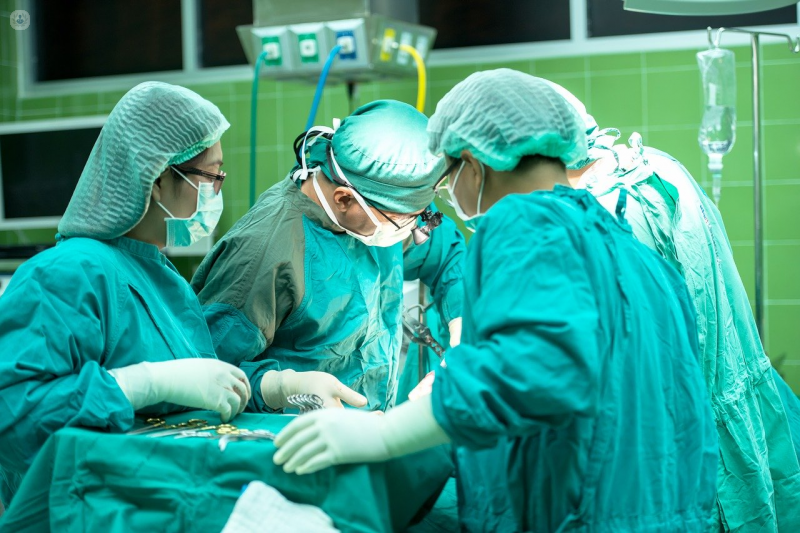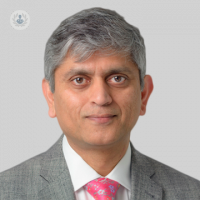Oesophageal cancer how curable treatment options
Escrito por:The oesophagus, also known as the gullet, is the food pipe that connects the mouth to the stomach and forms part of the digestive system. In the UK, there are approximately 8,200 people diagnosed with cancer of the oesophagus every year. Although that figure suggests it isn’t that common, cases are rising especially in the western part of the world.
Prof Bijendra Patel, a pioneering upper GI and laparoscopic surgeon based in London, explains why oesophagal cancer rates are rising and walks us through the various treatment options available, including radiotherapy, chemotherapy and surgery.

What are the main causes of oesophagal cancer?
Oesophageal cancer is more common in men over the age of 55. It’s not genetic or inherited, so you can’t pass it on to your children. Your diet, lifestyle and certain environmental factors are believed to be some of the main risk factors of this type of cancer, which may include:
- Smoking — frequent exposure to cigarette smoke can damage the cells that line the oesophagus
- Drinking alcohol — in particular spirits, such as vodka and whiskey more than wine and beer
- Long-term acid reflux — it can cause changes in the lining of the oesophagus. It can develop into Barrett’s oesophagus which increases the risk
- Obesity — people who are overweight are more likely to have acid reflux
Studies have recently found that drinking black tea at high temperatures increases your risk of oesophagal cancer. It is thought that frequent exposure to very hot tea, resulting in minor burns along the oesophagus, can damage the cells and put you at a higher risk.
Environmental factors may also be somewhat responsible but this usually depends on where you live. Places like China and the Far East have higher incidence and is perhaps due to a combination of diet choices and various external factors. There may even be some racial factors that we don’t know about yet.
How can I reduce my risk?
You should focus on managing the above if any apply to you. For example, quit smoking, moderate your alcohol intake, maintain a healthy weight and get proper treatment for your acid reflux.
Maintaining a healthy diet is extremely important when it comes to preventing oesophageal cancer; eating lots of fruits and vegetables every day can reduce your risk, as the added nutrition and antioxidants in the body can help fight cancer.
What are the symptoms of oesophageal cancer?
While some people may not show any symptoms at all, the most common is difficulty swallowing and feeling as though there is food stuck in your throat. Some other associated symptoms include:
- Acid reflux, heartburn and indigestion
- Difficulty in swallowing solids or liquids
- Coughing or vomiting blood or passing black stools
- Iron deficiency anaemia
- Unintended weight loss
It is important to note that signs and symptoms can be very subtle, and as mentioned before, some people don’t notice any at all.
How is it diagnosed?
It’s quite hard to diagnose which is why it’s found quite late in many people. Often, people put it down to indigestion and take medications to manage it, which just delays the diagnosis.
A patient would need to undergo endoscopy as this is the only way to pick it up. The use of CT scans or MRIs won’t show cancer unless it’s very advanced.
If your doctor detects cancer cells in your oesophagus from the endoscopy, you will need to undergo more tests to see if it has spread and at what stage it is at. These tests may include:
- Blood tests
- X-ray
- CT scan & PET scan
- Endoscopic ultrasound
- Laparoscopy
What are the treatment options?
Oesophageal cancers are not treated by a single doctor: There is a multidisciplinary team who work together to offer the best treatment for the patient. This may include a cancer surgeon, oncologist, radiologist, pathologist, clinical nurse specialist, etc. We always take on a team approach when managing this disease.
Treatment aims to either cure or control the disease and improve the quality of the patient’s life. Typically only around one-third of oesophageal cancers are curable and we will provide them with the appropriate radical treatment that would include a major operation along with chemotherapy and/or radiotherapy.
If the cancer is advanced, which happens in the remaining two-thirds of cases, then we will look at offering them palliative treatment, which may be able to shrink the cancer and improve symptoms, such as difficulty swallowing. This can help to control the disease and improve the quality of the patient’s life.
If we believe the cancer is treatable, we will give them either chemotherapy with or without radiotherapy before performing surgery. This lowers the risk of the cancer returning and increases their chance of survival. If the cancer isn’t curable, however, then palliative treatment is given which involves chemotherapy or radiotherapy without surgery.
What is the prognosis of oesophageal cancer?
For those who undergo curative treatment, 40% will survive one year or more. 15% will survive up to 5 years and up to 10% will survive 10 years or more. This all depends on the stage of the cancer and how quickly it was detected.
Prognosis based on the stage of the cancer:
- Stage 1 - 5-year survival is 55%
- Stage 2 - 5-year survival is 30%
- Stage 3 - 5-year survival is 15%
- Stage 4 - sadly, many people don't live beyond a few months to maybe a year
When is surgery recommended and how is it performed?
Surgery is only recommended if the cancer has not spread and we are trying to cure the disease.

There are various techniques to perform the surgery, which may include:
- Open surgery
- Robotic surgery
- Laparoscopic surgery
Sometimes a combination of all three is carried out, depending on the case.
What are the risks and success rate of surgery for oesophageal cancer?
The operation can be very complex and involves opening through the chest and abdomen. The oesophagus is an organ which is difficult to get to because it is sandwiched between lungs and heart, so accessing this area has a knock-on effect on your respiratory and cardiac system.
After the cancer is removed, a surgeon will need to rejoin the digestive system back together. This full operation is a big trauma to the patient; hence, it is only done by a limited number of surgeons.
Complications can occur, such as leaks joining the digestive tract together, pneumonia, chest infections and vocal chord paralysis. The risk of dying from oesophagal cancer surgery used to be around 8-10% in the past, however, with a multidisciplinary team approach by specialist doctors and the advances in medicine, it means that the chances of experiencing serious complications or dying after surgery is now less then 4% in most specialist centers.
How can we improve survival rates?
Early diagnosis is the key to improving survival which means being vigilant and not ignoring early symptoms of heartburn and indigestion. The use of high-quality surgical treatment together with chemotherapy or radiotherapy can drastically improve the survival rate. To prevent oesophagal cancer coming back, we give chemotherapy both before and after the operation.
There is some ongoing research that suggests aspirin might be effective at preventing it from returning. In addition, new chemotherapy treatments are being used in clinical trials to try to reduce the toxicity of the drug.
If you are experiencing any of the symptoms mentioned in this article and you are worried, don’t hesitate to book an appointment with Prof Bijendra Patel through his Top Doctors profile.


